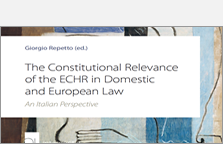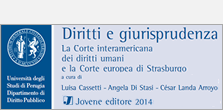Sezioni Generali / General Sections
- Enforcement delle decisioni della Corte di Strasburgo (CEDU) | The Enforcement of ECtHR Decisions
- Diritti, Costituzione e CEDU | Rights, Constitution and ECHR
- Diritti e argomentazione della Corte EDU | Rights and Legal Reasoning of the ECtHR
- Lo straniero e la CEDU | Foreign Nationals and ECHR
- Proprietà privata | Property
- Libertà di pensiero, coscienza e religione | Freedom of Thought, Conscience and Religion
- Libertà di espressione | Freedom of Expression
- Situazioni giuridiche soggettive | Civil Rights and Obligations
- Principi e tutela penale | Criminal law Protection
- Processo penale e diritti sovranazionali | Criminal Procedure and supra-national Rights
- Giusto Processo Amministrativo | Administrative due Process
- Fisco e diritti | Taxes and Rights
- Globalizzazione e diritti | Globalization and Human Rights
Iscriviti alla nostra Newsletter
Archivio
Info Generali / General Info
"Si fermi il brutale attacco di Erdogan al popolo curdo": l'appello di docenti, studenti e personale delle Università del Rojava e di Kobane (14.10.2019)
Si segnala l'appello di docenti, studenti e personale delle Università del Rojava e di Kobane, contro il brutale attacco di Erdogan e del suo governo ai popoli liberi del Rojava e della Siria del Nord.
Chiunque voglia comunicare la propria adesione può scrivere a: appellouniversitarojavakobane@gmail.com
Notizie Flash | Flash News
- S. Cociani, Il diritto al silenzio nell’attuazione del tributo, Torino, 2025 (Indice e Abstract) - https://diritti-cedu.unipg.it/wp-content/uploads/2025/10/CIJ_-OBBLIGHI-CLIMATICI_187-20250723-adv-01-00-en.pdf Read more →
- Cassazione SS.UU., Ord. n.20381 del 21.07.2025 – Giurisdizione giudice italiano-Responsabilità-Contenzioso climatico - https://diritti-cedu.unipg.it/wp-content/uploads/2025/10/CIJ_-OBBLIGHI-CLIMATICI_187-20250723-adv-01-00-en.pdf Read more →
- Corte Internazionale di Giustizia, Parere 23.07.2025-Obblighi degli Stati rispetto al cambiamento climatico - https://diritti-cedu.unipg.it/wp-content/uploads/2025/10/CIJ_-OBBLIGHI-CLIMATICI_187-20250723-adv-01-00-en.pdf Read more →
- Intervista a Luisa Cassetti e Angela Di Stasi sul loro libro “Diritti e giurisprudenza. La Corte interamericana dei diritti umani e la Corte europea di Strasburgo” (Jovene Editore)
Audio integrale
Se non riesci ad ascoltare l’intervista, clicca qui
—-
Copenhagen Declaration (12 and 13 April 2018)
Copenhagen Declaration The High Level Conference meeting in Copenhagen on 12 and 13 April 2018 at the initiative of the Danish Chairmanship of the Committee of Ministers of the Council of Europe (“the Conference”)... Read more →
Ultime Notizie
Corte EDU, I sez., sent.30.01.2025, Case of Cannavacciuolo and Others v. Italy (Sentenza pilota – Condannata l’Italia per aver violato il diritto alla vita (art.2 CEDU) nel territorio denominato “Terra dei fuochi”)
CORTE EDU Sorasio c. Italia 2023
CASE OF LOCASCIA AND OTHERS V. ITALY
COCIANI S.F. – Ancora sulla pubblicazione in rete di un elenco di evasori fiscali. La Gran Camera accerta la violazione dell’art.8 della CEDU.
TONELLI L.M. – LA SENTENZA DEL 24 MARZO 2021 DEL BUNDESVERFASSUNGSGERICHT SUL CAMBIAMENTO CLIMATICO E LA RIFORMA DELL’ART. 9 COST. IN ITALIA: PROFILI DI CONVERGENZA TRA L’ORDINAMENTO COSTITUZIONALE TEDESCO E QUELLO ITALIANO
- GRAND CHAMBER - CASE OF L.B. v. HUNGARY (Application no. 36345/16) (256408 download )
- CAUSA DE GIORGI c. ITALIA (Ricorso n. 23735/19) (241997 download )
- AFFAIRE SCAVONE c. ITALIE (Requête no 32715/19) (293451 download )
- CAUSA LANDI c. ITALIA (Ricorso n. 10929/19) (212531 download )
- Corte Eur. Dir. Uomo, Sez.I., sent. 4 luglio 2020, Citraro e Molino c. Italia (ric.n. 50988/13) (199338 download )













